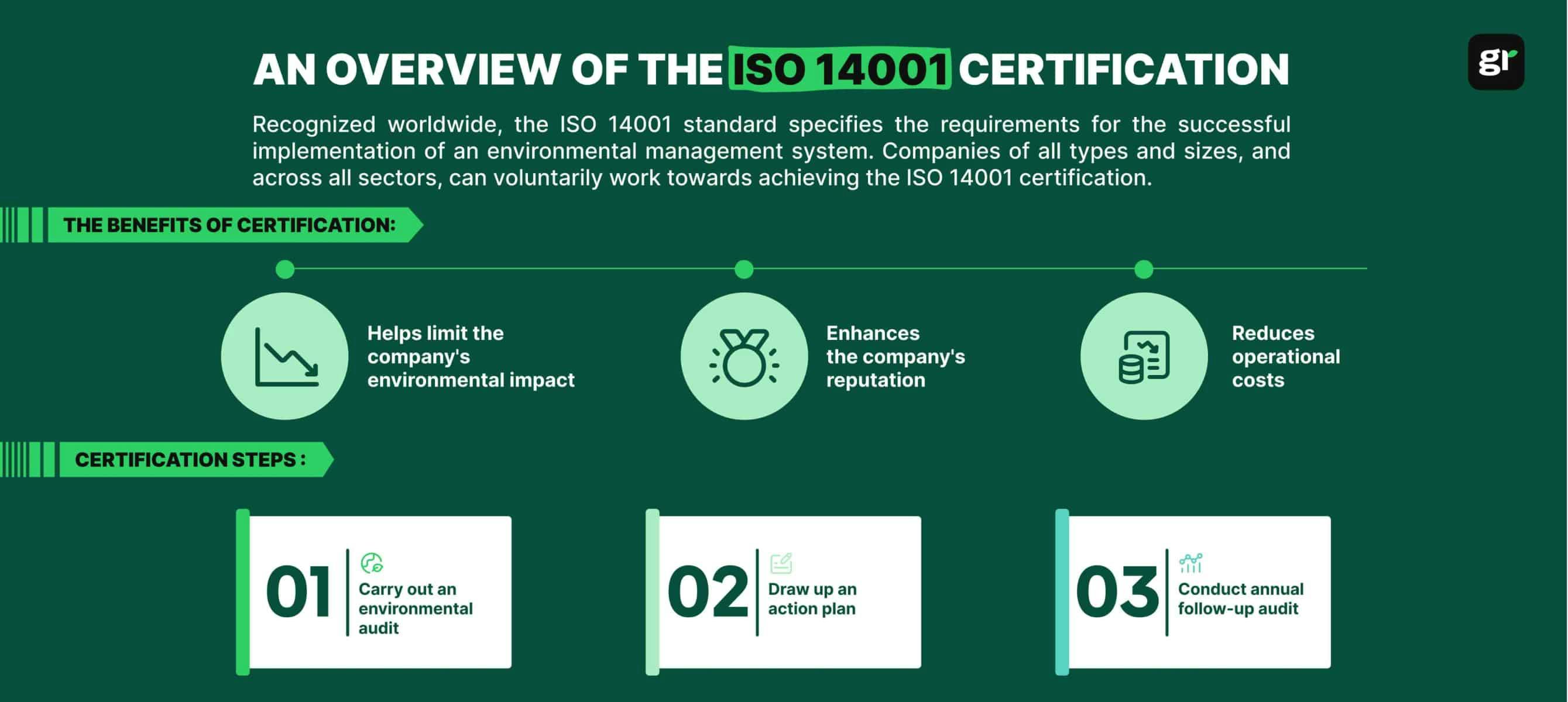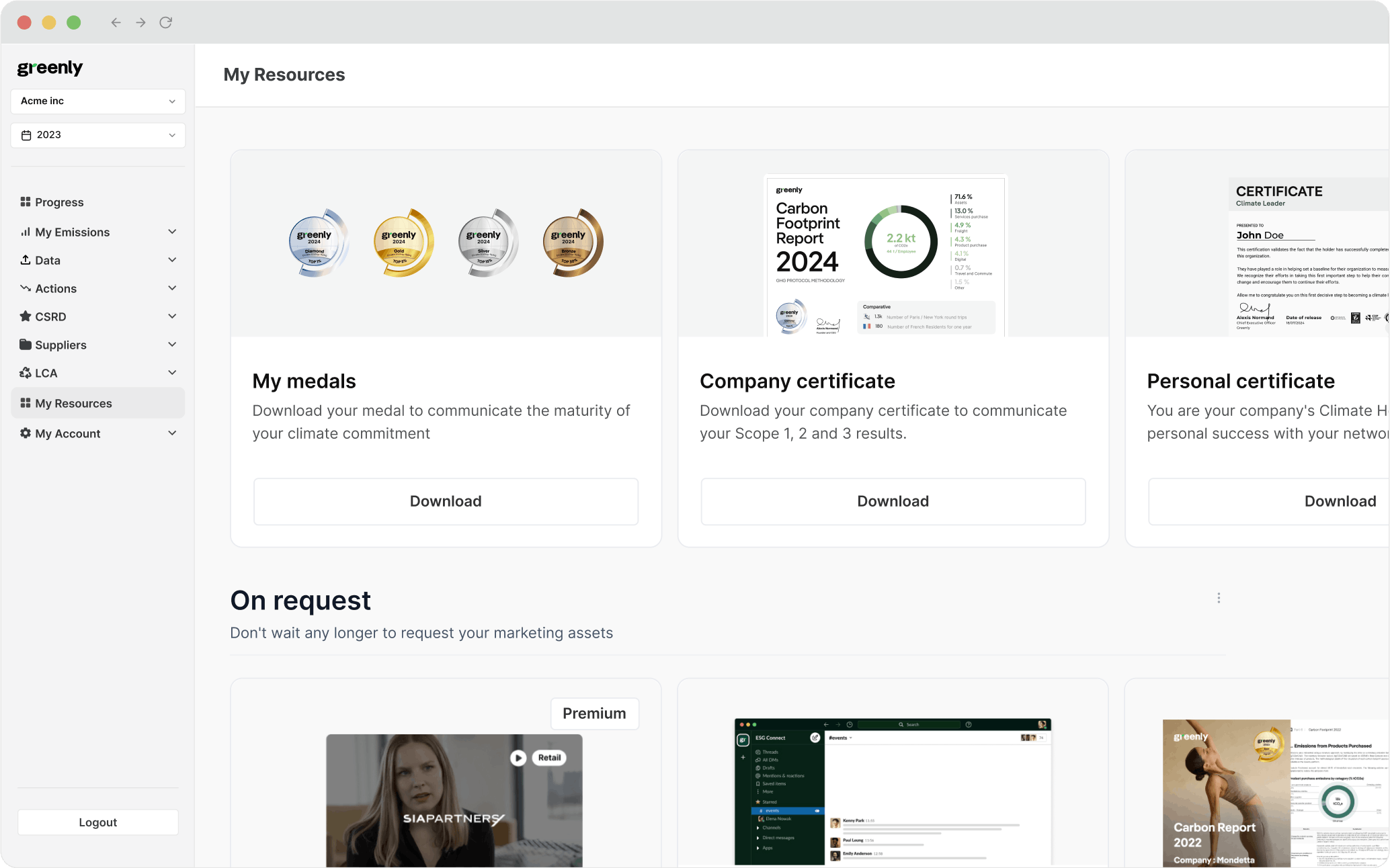
What are the 3 Pillars of Corporate Sustainability?
In this article, we'll explore what the 3 pillars of corporate responsibility are, why they're important, and how businesses can turn them into practical action.
ESG / CSR
Industries



Have you ever wondered how leading organizations systematically manage their environmental impact while maintaining regulatory compliance and business growth with ISO 14001 Standard?
Environmental performance evaluation and keeping track of our environmental footprint is becoming not only a regulatory compliance, but a critical component for corporate environmental obligations to ensure cost savings, pollution prevention, improve life cycle analysis, and overall performance improvement for businesses.
Organizations seeking certification can partner with third-party auditors to ensure the processes required to gain a certification body such as an ISO 14001 are met.
In this comprehensive guide, we'll explore what ISO 14001 entails, how compliance delivers measurable benefits to your organization, and the specific requirements needed to acquire this internationally recognized certification.
ISO 14001 is an internationally recognized standard, developed by the International Organization for Standardization (ISO), which defines the requirements for implementing and maintaining an effective Environmental Management Systems (EMS).
As a whole, the management system standards depicted in ISO 14001 can allow companies to identify, manage, and monitor their environmental risks and responsibilities in a systematic way – making environmental management and overall sustainable development more approachable.
ISO 14001 consists of five key elements:
In order to obtain an ISO 14001 Environmental Management certification, it is necessary to provide documentation that proves that your company's Environmental Management System (EMS) meets the standard requirements.
Even if all of your plans to operate sustainably have yet to be fully implemented, your documentation must clearly illustrate a comprehensive roadmap with measurable milestones toward a more sustainable future. Furthermore, it is important that your documentation outlines future plans to employ these practices – such as via efforts to manage resource consumption, waste minimization, employ support techniques, or seek independent verification.
It is crucial that the company as a whole is cognizant of the environmental strategies in place so that the whole supply chain can work towards the company's environmental responsibilities and obtain them more efficiently via environmental controls.

Environmental Management Systems provide comprehensive, structured frameworks and practical implementation tools that empower organizations to strategically identify, manage, and reduce their environmental impact while simultaneously working toward their sustainability objectives.
This is achieved through the use rigorous documentation and continual progress reporting of a company's environmental performance metrics and corporate sustainability policies.
However, it is important to note that Environmental Management Systems adopt a flexible approach towards improving environmental performance and don't prescribe specific environmental targets that must be achieved across all organizations. Therefore, Environmental Management Systems should be adjusted or personalized by company management or leadership to align with the organization's unique industry challenges and individual sustainability goals.
An Environmental Management System is an affordable, methodical system that allows an organization to implement the systematic changes necessary to achieve an ISO 14001 certification. It helps identify and manage the environmental aspects present throughout an organization's operations, including those that are exceed regulatory requirements, are not compulsory, and would otherwise remain unaddressed in conventional business practices.
Environmental Management Systems allow companies with the robust tools needed to recognize, quantify, analyze, assess, and continuously reduce their carbon footprint. This structured approach also encourages organizations to proactively address environmental challenges and implement targeted actions to achieve new ambitious environmental objectives.
Establishing an Environmental Management System serves as the ultimate pathway for an organization to receive an ISO 14001 certification.
As explained before, an ISO 14001 serves as a model to help a business or project establish effective environmental management practices. It also enables companies to cultivate a greater sense of trust and transparency with both internal and external stakeholders (i.e. consumers, investors, and employees) – ultimately enhancing brand reputation, gaining a competitive advantage, and supporting long-term business growth and resilience.

Does it matter which version, ISO 14001 (2004) or ISO 14001 (2015), is used for your organization's management approach and certification journey?
The current version of ISO 14001 (2015) establishes more rigorous legal compliance requirements for organizations seeking ISO certification in comparison to its predecessor. It uses concrete environmental definitions and also includes new sections not previously found in ISO 14001 (2004), which focused on proactive initiatives for environmental protection and life-cycle analysis.
As part of ISO's international standardization initiative to structure all management system and ISO standards the same way, the ISO 14001 (2015) revisions adopted the Annex SL high-level structure – which implements the use of mandatory definitions, common core requirements, and consistent clauses across all ISO management system standards.

However, the biggest change to ISO 14001 (2015) are the new requirements for executive leadership engagement, strategic stakeholder interactions, the necessity for comprehensive risk-management, proactive pollution prevention measures, increased 'essential documentation' requirements, and heightened organizational accountability regarding environmental impacts across the entire value chain.
ISO 14001 (2015) mandates that organizations demonstrate a higher level of commitment and executive leadership with regards to the development, implementation, and continuous improvement of their Environmental Management Systems.
Rather than simply vowing to not cause further harm to the environment, the company must strive to actively reduce their carbon footprint and other aspects of their environmental impact.
The new ISO 14001 requires organizations to systematically identify and consider the needs and expectations of all other relevant stakeholders involved in the business or project, and to thoroughly assess potential environmental, business, and reputational consequences if the objectives of their EMS are not achieved.
In contrast to ISO 14001 (2004), ISO 14001 (2015) requires organizations to consider how their environmental goals will impact both internal operations and of the company impact both internal operations and broader society. This allows for a more thorough risk-management assessment and creates opportunities to improve upon environmental targets previously set in place, helping to further develop their integrated management system.
Lastly, the new ISO 14001 (2015) requires organizations to adhere to the new, stricter environmental regulations in place. For example, the life cycle of a product or service and its environmental impact on the environment is imperative in the new ISO 14001. Products and services must be designed and utilized in alignment with the environmental targets set by the organization. This ultimately allows the company to improve their sustainability, while also positively impacting the environment and building a more successful business.
As established above, ISO 14001 (2015) employs more quantitative performance indicators, numerical data, empirical evidence requirements, and precise terminology to strengthen the efficiency and effectiveness of an Environmental Management System, while demanding more comprehensive environmental stewardship from organizations seeking ISO 14001 certification.
Given these substantial updates, greater performance expectations, and stricter requirements of ISO 14001 (2015) in comparison to the outdated ISO 14001 (2004) – environmental management experts strongly recommended organizations to implement and align their overall management system with the current ISO 14001 standard to ensure optimal environmental and business benefits.
The table below will further depict the differences between ISO 14001 (2004) and ISO 14001 (2015):
| Feature | ISO 14001:2004 | ISO 14001:2015 |
|---|---|---|
| Context of the Organization | No specific requirements to understand the organization context | Requires organizations to understand the context in which they operate, including internal and external issues |
| Leadership | Less emphasis on leadership | Emphasizes the role of top management in integrating environmental management into business processes |
| Risk-based Thinking | No explicit requirement for risk-based thinking | Introduces risk-based thinking to identify and address potential risks and opportunities |
| Environmental Objectives | Objectives were required but with less emphasis on how to achieve them | Requires setting environmental objectives and planning to achieve them, including criteria for evaluating performance |
| Communication | Communication was more internally focused | Requires both internal and external communication on environmental performance and the effectiveness of the EMS |
| Documentation | Focus on documented procedures | Less prescriptive on documentation, allowing flexibility in how information is documented |
| Life Cycle Perspective | No specific requirement to consider a life cycle perspective | Requires organizations to consider the environmental aspects of their activities, products, and services from a life cycle perspective |
| Performance Evaluation | Emphasis on internal audits and management review | Focuses on performance evaluation including monitoring, measurement, analysis, and evaluation of environmental performance |
| Continual Improvement | Requires continual improvement but less structured approach | Structured approach to continual improvement of the EMS to enhance environmental performance |

The easiest way to think about the benefit of acquiring an ISO 14001 is to compare it the benefits of a degree in higher education.
Now imagine that you're in a job interview to become a junior environmental scientist. You've never held the position before, but you're passionate about the subject and know that you're up to the job. But how does the hiring manager know that you're qualified for the position? Can we really expect them to simply take our word for it?
Thankfully, in this imaginary scenario, they don't have to – as a degree from a higher educational institute is usually used to verify your credentials. Furthermore, our degrees prove that we've invested time and money to acquire extensive experience and knowledge. The likelihood of being taken seriously on a job interview is greater if you have enrolled in higher education, or any other post-education experience that allows you to obtain a proper certification.
Well, the same is true for companies who hold an ISO 14001 certification – the proof of adhering to the practical tools and frameworks provided by ISO 14001 establishes greater security for all third-parties involved in the project.
The international standard will encourage investors, employees, and society to trust your company's mission. It proves to stakeholders that the company is taking steps that positively impact the environment.
There are many benefits to acquiring an ISO 14001 certification for your company - whether you're international or locally operated organization.
Let's take a look at some of the benefits below:
Similar to the ideal of corporate sustainability, receiving an ISO approval for your company can ensure your business runs more efficiently and successfully.
The flip cards below will explain some of the ways that ISO 14001 could help boost efficient business performance:

Getting an ISO certification has a number of positive environmental impacts. It can help maximize waste reduction, improve resource efficiency, lower overall expenditures, and commits a company to monitoring their environmental impact and carbon footprint.
The drop down section below will explain the various environmental benefits associated with ISO 14001:
ISO 14001 encourages organizations to reduce waste through more efficient operations and responsible disposal practices.
Through structured environmental management, companies can use materials, energy, and water more efficiently.
Efficient resource use and waste reduction often lead to significant cost savings over time.
ISO 14001 requires continuous monitoring and improvement of a company’s environmental performance, including carbon footprint tracking.
The new ISO 14001 (2015) requires that companies significantly decrease the amount of waste they produce.
This could include the following efforts:
Reducing waste can not only benefit the environment and help a company to run more efficiently, but it is also cost effective.
Obtaining an ISO 14001 (2015) certification motivates companies to reduce their waste, to improve their energy usage and raw materials sourcing, as well as to optimize their carbon footprint. As a result, the organization will see continual improvement when it comes to operating costs, too.
Also, keep in mind – if less production and materials are required, simpler insurance plans can be purchased to protect the company. This decreases the company's expenditures, while simultaneously benefiting the environment.
In addition to the clear, positive environmental effects of obtaining an ISO 14001 (2015), it also has a wide array of fiscal benefits. For instance, obtaining an ISO 14001 guarantees that your company is acting in accordance with all current regulations and legal obligations.
This legal compliance provides investors, employees, and consumers with the assurance that the company can be trusted and is worth collaborating with in future business partnerships. Ultimately, this provides the company with a competitive advantage.
Several companies have been successful with ISO 14001, including:
ISO 14001 is an international standard that can be granted by the American Standards Institute (ANSI), the International Accreditation Forum (IAF), and the BSI Group.
The ISO 14001 certification is renewable for up to a period of three years, after which another ISO 14001 can be requested.
In order to acquire an ISO 14001, it is necessary to provide documentation that a company's Environmental Management System is aligned with current standards. While not all corporations will have the exact same Environmental Management System, it's important that the company is dedicated to working towards all of the targets they have established.
A clear assessment of environmental performance must be included in the documentation in order to obtain an ISO 14001. This testament should include numerical data on the use of water, electricity, and gas, how much waste is produced, air emissions, sewage disposal, and plans for future maintenance on activities that could produce a large carbon footprint.
Requirements for an ISO 14001 include:
The multi modal content below will provide some sample mission statements by industry:
This management review and data evaluation will allow the company to create and instill a sustainable plan with environmental goals that align with their company's mission, and begin their journey towards being more environmentally friendly.
It is imperative to show that your company is prepared to respond in the event of an emergency, with as little damage done to the environment as possible : such as electricity loss, fire, or a flood.
Consistent communication, both within the company and to third party suppliers, ensuring that these new regulations are in progress – is also necessary to obtain an IOS 14001.
It is important to track and document your company's progress towards achieving their environmental goals, as well as any obligations your company has to any third parties.
All in all, there are many documents required in order to successfully obtain an ISO 14001 (2015) – but an organized business will likely already have many of these documents in order.
Your company can get started with ISO 14001 by taking a look at its supply chains, implementing an effective EMS system, and seeking the help of a third party, external organization like Greenly to find the best practice right for your company and to continually improve ESG practices and be viewed as honorable to certified organizations.
First, it is important to clearly define your company's objectives, and outline exactly how your company will achieve those goals.
Secondly, make sure that your team is committed and supports the general guidelines required throughout the process to acquire ISO 14001 process. They should receive proper training to ensure that the company's Environmental Management System can operate at maximum efficiency, and will also ensure that they're aware of the demands needed to document progress.
Lastly, it's important to summarize the tangible benefits or impact your organization has on the environment, and to establish attainable goals to promote environmental sustainability.
If your company is willing to monitor, adjust, and continuously implement new environmental regulations and record documentation of these actions – your company will be well on their way to obtaining an ISO 14001 (2015).
Our climate experts are on hand to support your organization on the implementation of an effective environmental policy, as well as with your environmental communication!
We can provide assistance with the following and ultimate help your organization acquire a certification for ISO 2015 with:
Click here to learn more about Greenly and how we can help you reduce your carbon footprint.
Don't wait any longer, take the first step towards reducing your carbon footprint by requesting a free and non-binding demo with one of our experts today and finding the solution that best fits your business needs.
If reading this article about ISO 14001 has made you interested in reducing your carbon emissions to further fight against climate change – Greenly can help you!
The process to obtain an ISO 14001 can be confusing without the help of a third party, but don’t worry – we offer a free demo for you to better understand our platform and all that it has to offer – including assistance with boosting supplier engagement, personalized assistance, and new ways to involve your employees.
Learn more about Greenly’s carbon management platform here.
